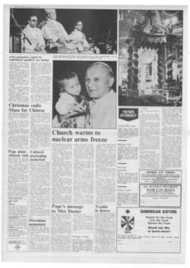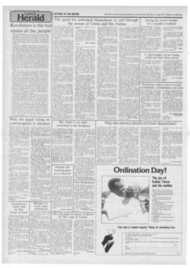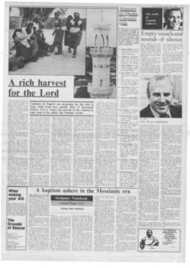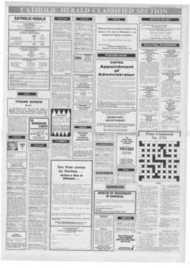Page 2, 8th January 1982
Page 2

Report an error
Noticed an error on this page?If you've noticed an error in this article please click here to report it.
Tags
Share
Related articles
Knuckle-rapping For The Placid Lady?
The Nuclear Dilemma
Winter Freeze Plan
The Lesson Is Simple: 'love Your Enemy'
Us Bishops Curb Hard Peace Line
Church warms to nuclear arms freeze
SEVERAL prominent bishops in the United States have savagely criticised the "essentially evil" nuclear arms policy race by the American government.
The criticisms appear in the Christmas messages of six leading clergymen, including Archbishop Rembert Weakland of Milwaukee who publically backed a national campaign for a nuclear arms freeze.
That the Church in America is deeply divided on the issue, of the arms race was demonstrated in a letter by Cardinal Terence Cooke of New York to the nation's Catholic military chaplains in which he called a policy of nuclear deterence "morally tolerable" as long as the United States is prudently seeking international agreements aimed at nuclear disarmament.
Bishop Roger Mahoney of Stockton, called for a "fundamental about face in the arms race" and urged Catholics to make their Church a "peaceadvocate Church".
In a recent pastoral letter, the bishop bluntly declared that American and Soviet nuclear deterrence policies immoral and called on Catholics to oppose those policies.
The Church "accepts the premise that one can legitimately resist evil by force in justified selfdefence," the bishop said. "It has espoused the a a complex moral reasoning about the right to declare and engage in warfare. known as 'the just war theory'.
"Nevertheless, in recent years, more and more Catholics — our Popes, bishops, in this country and elsewhere, theologians and other scholars, and conscientious priests, religious and lay Catholics throughout the 'world — have increasingly asked: How can we become truly advocates of peace'?"
Bishop James Malone of Youngstown, Ohio, said in a Christmas pastoral letter: "We cannot indefinitely justify the possession of nuclear arms in the name of peace."
The bishop, who is vicepresident of the National Conference of Catholic Bishops, quoted the words of Pope John Paul II at the United Nations in 1979: "The continual preparation for war, demonstrated by production of ever more numerous, powerful and sophisticated weapons ... shows that there is a desire to be ready for war, and being ready means being able to start it it also means taking the risk that sometime, somewhere, somehow, someone can set in motion the terrible mechanism of general destruction."
According to Bishop James Casey of Denver "This nuclear madness drains precious resources and captivates our society in an endless maintenance of an illusory balance of terror." Other bishops urged workers engaged in the production of
weapolns to examine their consciences on the morality of ho,ding those jobs. In Columbus, for example, where th. administration's decision to resume production of the B-1
bomber means more than 7,000 new jobs at the local Rockwell plant, Bishop Edward Herrmann expressed sympathy for those facing the dilemma of joblessness or "producing something of which, under better economic circumstances, they might not wish to be a part."
He urged the workers to form their individual consciences in the light of Church teachings and asked all to work for peace, saying that "the very created order is threatened by nuclear war."
Archbishop Weakland wrote: "If a nation continued its proliferation of nuclear arms — thereby increasing the possibilities of total destruction — and was not using all of its diplomatic and political persuasion to negotiate reduction to zero point, it would be doubtful that such a nation could be free of grave moral responsibility.
"We are such a nation ... We, as a people and as individuals, cannot claim to be free of guilt if we do not join in this crusade to freeze nuclear arms and gradually reduce them to zero," the Archbishop said.
blog comments powered by Disqus











